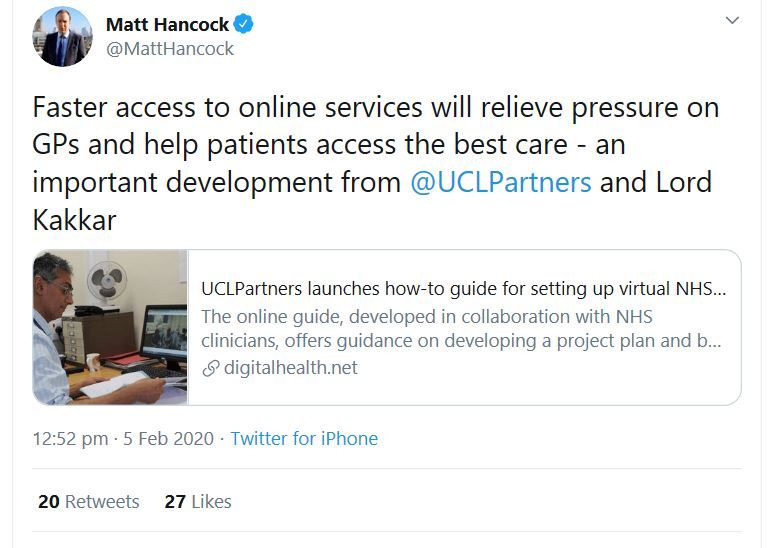Supporting the set-up of non face-to-face clinics
The challenge
With the COVID-19 pandemic, non face-to-face clinics (also known as virtual clinics) have rapidly become an essential component of NHS delivery, with the NHS moving at unprecedented speed to set up remote consultations.
Prior to COVID-19, progress had been slow. The NHS Long Term Plan set the aim of avoiding up to a third of the number of face-to-face outpatient visits over five years, removing the need for up to 30 million outpatient appointments each year. However, there was little practical guidance available on how to develop this approach.
What we did
A key aspect of UCLPartners’ role is to support our local healthcare system to innovate at pace, learning from what has worked elsewhere and adapting to fit local needs. We worked with NHS clinicians, managers and patients to develop an online how-to guide to help embed non face-to-face clinics. We didn’t know it at the time, in advance of the coronavirus pandemic, but this work would prove vital in providing a well-evidenced source of guidance for teams across our NHS partners and beyond to draw on in rapidly setting up virtual clinics in response to COVID-19.
We started by identifying and reviewing the evidence for different models of non face-to-face clinics. We also met with NHS partners operating established and nascent non face-toface clinics to understand key enablers in their successful implementation. Through focus groups including patients, clinicians, and commissioners this information was synthesised and contextualised to develop a how-to guide.
The freely available resource, delivered through both text and videos, provides a comprehensive guide to setting up non-face-to-face clinics, including how to develop a project plan and business case.
Lots of discussion about opportunities at the moment to support patients in different ways. This is a useful new resource
How-to guide user
In February 2020 we held a launch event, with speakers including Steve Shaw (Medical Director for Outpatient Transformation, NHS London) about the future of non face-to-face models, and Sheila Johnston (Lead Nurse for Nephrology, Royal Free Hospital) about her experience of running a virtual renal clinic.
Partners involved in developing the resource include:
- Patient and public representatives
- Barts Health NHS Trust
- Royal Free London NHS Foundation Trust
- University College London Hospitals NHS Foundation Trust
- Whittington Health NHS Trust
- University College London
- North Middlesex University Hospital NHS Trust
- One London
- Queen Mary University of London
- Health Education England
Impact
Our guide has had more than 7,000 unique page views since January. We saw significant engagement with the resource as the pandemic took hold.
Following the launch, Secretary of State for Health and Social Care Matt Hancock MP tweeted support for the guide.

Feedback has included:
- “Such a useful whole of system view on adapting to new models of care in particular on outpatient contexts. Thanks for publishing this resource UCLPartners.”
- “Great to see the sharing from colleagues at UCLPartners. Thanks for the hard work developing it.”
Since the launch of the guide our work to support virtual consultations throughout our region has developed in response to COVID-19. We have been working with the other London AHSNs and the NHS England & Improvement team to support the roll out of the Attend Anywhere remote consultation solution in secondary care trusts across London.
Using a collaborative, pan-London approach, we are actively supporting trusts to share learning, capture best practice and develop new methods to better understand how best to implement and use virtual consultations.